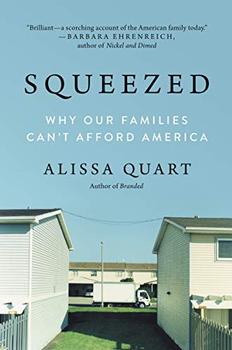Summary | Excerpt | Reading Guide | Reviews | Beyond the Book | Readalikes | Genres & Themes | Author Bio

Why Our Families Can't Afford America
by Alissa Quart
I call this just-making-it group "the Middle Precariat," after the precariat, a term first popularized six years ago by the economist Guy Standing to describe an expanding working class burdened with temporary, low-paid, and parttime jobs. My term, the Middle Precariat, describes those at the upper end of that group in terms of income. Its membership is expanding higher and higher into what was traditionally known as the solid bourgeoisie. These people believed that their training or background would ensure that they would be properly, comfortably middle-class, but it has not worked out that way. Their labor has also become inconstant or contingent—they do short-term contract or shift work, as well as unpaid overtime. They also do unpaid shadow work, like adjunct professors putting together packets for their classes off the clock, in contrast to their tenured colleagues. And it's worse for the Middle Precariat of color, which typically has much less retirement security and ability to pay college tuition.
Like the classic precariat, the Middle Precariat has lost the narrative of their lives and futures. Who are they and what will they become? Their income has flatlined. Many are "fronting" as bourgeois while standing on a pile of debt. There are many culprits for the straits in which they find themselves—most crucially growing income inequality, or as the business TV shows like to call it euphemistically, as if to deny their role in creating it, "disparity." The United States is the richest and also the most unequal country in the world. It has the largest wealth inequality gap of the two hundred countries in the Global Wealth Report of 2015. And when the top 1 percent has so much—so much more than even the top 5 or 10 percent—the middle class is financially and also mentally outclassed at each step.
Behind the proverbial velvet curtain—or midrange eggshell-colored Roman blinds—these parents are desperately holding on to their status and trying to keep up appearances.
This is a true historical shift. When I posted on Facebook that I couldn't afford the relatively modest life my academic parents had, many friends added their own stories about how their income goes to rent and child care—the latter often siphoning off up to 30 percent of a family's earnings. The cost of having kids can seem like Eric Carle's The Very Hungry Caterpillar: just like the caterpillar in the classic children's book, your child eats up every dollar you earn. The cost of child care reflects a reality principle: according to a 2016 study by the Equality of Opportunity Project, Americans born in the 1940s had a 92 percent chance of making more money than their parents did at age thirty. Those born in the 1980s have around a 50 percent chance of earning more than their parents. (In the Midwest, as the New York Times reported, the odds are less than half.)
When I was a young child, professional aspiration was synonymous to me with the clatter of my mother's highheeled boots as she went off to teach each 1970s weekday morning, carrying her graded blue books under her arm. Each day was concluded when my exhausted mother picked me up late at the very end of after-school and took me home for a dinner of spaghetti and meatballs. Yet despite the evident effort they put in, my parents, college professors, had health insurance and the promise of pensions and Social Security. In their younger days, there were ample employment opportunities and cheaper rents in metropolitan areas. They could afford some extras that would strain a similar family today: out of their wages from teaching at a college, I received ice skating lessons. I was sent to a New York City private school, and we went on long vacations at the shore, where I could buy a kite in the shape of a butterfly and maybe collect wild plums on the dunes. They weren't alone. "Middle-class" used to mean having two children and sending them to high-quality public schools, or even occasionally to private schools. It meant new brown Stride Rite Mary Janes with little purple and silver flowers when the old shoes were pinching the toes. It meant homeownership—not for us, but for others like us. Nothing fancy, but a proper ranch house with a garage. It meant weekends off with your family, sometimes spent at a matinee at a "movie palace," or a play thanks to a theater subscription, and workdays that ended at six so that the family all ate dinner together. And of course, it meant saving money as well as being able to pay for the children's college education.
Excerpt from Squeezed: Why Our Families Can't Afford America by Alissa Quart. Copyright 2018 by Alissa Quart. Excerpted by permission of Ecco, an imprint of HarperCollins Publishers.
Your guide toexceptional books
BookBrowse seeks out and recommends the best in contemporary fiction and nonfiction—books that not only engage and entertain but also deepen our understanding of ourselves and the world around us.